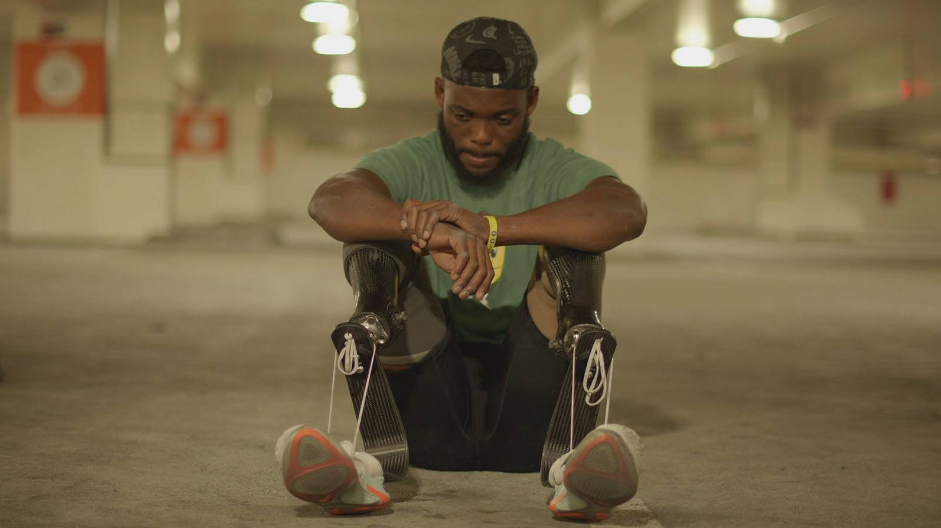
Film Review: Abled
Film Reviews
Abled
Director: Einar Thorsteinsson
Union Editorial
“These next 12 months will dictate my next 12 years,” Blake Leeper says as he fixes on his prosthetic legs on the side of the running track. An eight-time Paralympic medal recipient, Leeper is the focus of the documentary film Abled and is hard at work training to compete in the 400m event at the Tokyo Olympics.
Leeper was born with legs that only grew to knee length and wore prosthetic legs from the time he was old enough to walk. He makes it very clear that those closest to him (his brother, parents, friends, coaches and teammates) never treated Leeper differently than any other child. “I put my life into this sport like anybody else,” he says.
Leeper’s hard work pays off as he becomes the first double amputee in history to run a 400m in 44 seconds. It’s a tremendous achievement that Leeper is confident will secure him a spot on the Olympic team, but he quickly receives communication from World Athletics (formerly the IAAF) that the prosthetic blades with which he runs are considered “technological doping,” effectively rendering any of his race times moot. Leeper’s disability is perceived as an advantage. According to World Athletics, Leeper shoulders the burden of proving that his prosthetic legs don’t give him an unfair advantage.
From there, the film follows Leeper through all his ups and downs in the year leading up to the Tokyo Olympics: He struggles through personal pains and anxieties, works with a team of scientists to prove that his blades don’t give him an added advantage (spoiler alert: they don’t), takes on unique forms of training throughout the COVID-19 pandemic and, of course, fights an ongoing legal battle with World Athletics.
Leeper draws many comparisons between himself and the only other double amputee to ever compete for the Olympics, Oscar Pistorius (who is notorious for murdering his girlfriend). Leeper emphasizes that their cases are not being treated the same. While Pistorius was allowed to compete in the Olympics, World Athletics deemed a double amputee competing in abled-bodied races as something to be considered on a “case-by-case” basis. On that note, Abled posits that World Athletic’s unwillingness to budge on Leeper’s case could be racially motivated.
For all its support of Leeper and his efforts, Abled only scratches the surface of his amazing story, that contains many complex layers. Why does Leeper feel that his track times only really hold validity if he’s running in able-bodied competitions? Where do the intersections of racism and ableism meet? What biases exist within the sporting world against those with disabilities? How can bodily autonomy be more widely accepted in sports at large? Abled is willing to pose these questions but does little investigation to get answers.
Instead, the film is content to be a simple travelog of Leeper’s training and personal interactions. While this endears the audience to Leeper, the lack of narrative cohesion bars this story from fully blooming, blunting much of the emotional impact. The film is at its best when it keeps emotions natural, as the handful of “inspirational” training montages feel stilted and forced. Often, the least dramatic moments of Abled are the most profound, such as Leeper’s response to his denial from the Olympic team: “Where are my human rights? Oh, that’s right, I’m disabled. I don’t have any.”
To this day and in spite of all the effort from himself and the research done on his behalf, Leeper is still not permitted to race in the Olympics, nor the Paralympics, so long as he competes in the prosthetic legs he’s trained in for so many years. In spite of Abled’s narrative struggles, Blake Leeper’s story is one well worth telling, especially in a time where sports competitions are growing increasingly more exclusive and leaving little room for those who don’t fit a specific demographic. Sports competitions cannot and should not be “one size fits all.” –Seth Turek
Read more in the latest film reviews:
Film Review: No Hard Feelings
Film Review: Farewelling
